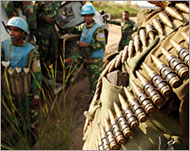UN: Congo militias on the offensive
Militia groups in Congo’s lawless Ituri district are swelling in numbers and on the offensive, just months before planned elections as attempts to disarm them fail, according to the UN.

UN peacekeepers are battling daily to protect the Congolese army from repeated attacks by the resurgent militias, which have regrouped since a UN-led offensive last year reduced them to just a few hundred fighters.
On Thursday, Major Hans-Jakob Reichen, a spokesman for the UN forces in eastern Congo, said on phone from Bunia, Ituri maun town: “The number of 2000 is pretty accurate and their numbers are going up, not down. This is because they are recruiting and the lack of integration into civilian life after disarmament.”
He added: “Some of those who disarmed have rejoined the militia.”
Some 60,000 people have been killed in Ituri by ethnic clashes and fighting over minerals and taxation since 1999.
UN operations
Long accused of not doing enough to halt the violence in Ituri, the UN launched robust operations in 2005, sending commandos and helicopter gunships to break up militia camps. Over 15,000 fighters signed up to a disarmament programme.
But analysts say the failure to offer former gunmen other opportunities and the continuing state of chaos in the army – which remains ill-disciplined, poorly paid and un-equipped – have handed the initiative back to the militias.
|
“We don’t know what their aim is but what we can say is that the militia are taking the initiative much more” Major Hans-Jakob Reichen, |
“We don’t know what their aim is but what we can say is that the militia are taking the initiative much more,” Reichen said.
The resurgence in militia activity comes as the giant central African state prepares for its first democratic elections in over four decades in June.
Presidential and parliamentary polls are the cornerstone of a string of peace deals that ended a 1998-2003 war, which sucked in armies from six neighbouring countries and killed five million people, mostly from hunger and disease.
Militia attacks
Pakistani and Bangladeshi blue helmets, backed by Mi-25 attack helicopters, fought off two separate militia attacks on Congolese army units in Ituri this week.
“There are reports of dozens (of militia) killed. But we can only confirm two militia dead near Tchomia and several near Kagaba,” Reichen said, referring to towns on Lake Albert, which separates Congo from neighbouring Uganda.
 |
|
Bangladeshi UN troops have |
A separate UN source told Reuters that peacekeepers in Ituri reported they had killed between 50 and 60 fighters but it was difficult to confirm the numbers as militiamen were carrying their dead away during the battle.
Rival militia groups, backed by Uganda and Rwanda during Congo’s war, have buried ethnic differences. They are fighting government attempts to stamp its authority on Ituri, where they controlled mines, ran cross-border trade and taxed civilians.
Peacekeepers have tried to help the army neutralise the groups but joint offensives were suspended this month when government forces mutinied, ransacking a UN base and opening fire on senior UN and government officers.